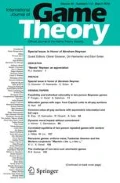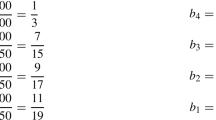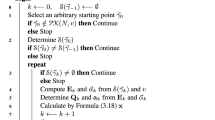Abstract
We consider matching markets at a senior level, where workers are assigned to firms at an unstable matching—the status-quo—which might not be Pareto efficient. It might also be that none of the matchings Pareto superior to the status-quo are Core stable. We propose two weakenings of Core stability: status-quo stability and weakened stability, and the respective mechanisms which lead any status-quo to matchings meeting the stability requirements above mentioned. The first one is inspired by the Top trading cycle and Deferred Acceptance procedures, the other one belongs to the family of Branch and Bound algorithms. The last procedure finds a core stable matching in many-to-one markets whenever it exists, dispensing with the assumption of substitutability.
Similar content being viewed by others
References
Abdulkadiroğly A, Sönmez T (1998) Random serial dictatorship and the core from random endowments in house allocation problems. Econometrica 66:689–701
Abdulkadiroğly A, Sönmez T (1999) House allocation with existing tenants. J Econ Theor 88:233–260
Alcalde J, Barberà S (1994) Top dominance and the possibility of strategy-proof stable solutions to matching problems. Econ Theor 4:417–35
Bird CG (1984) Group incentive compatibility in a market with indivisible goods. Econ Lett 14:309–313
Blum Y, Roth AE, Rothblum UG (1997) Vacancy chains and equilibration in senior-level labor markets. J Econ Theor 76:362–411
Cantala D (2004) Restabilizing matching markets at senior level. Games Econ Behav 48(1):1–17
Demange G, Gale D, Sotomayor MO (1987) A further note on the stable matching problem. Discrete Appl Math 16:217–222
Dubins LE, Freedman DA (1981) Machiavelli and the Gale-Shapley algorithm. Am Math Mon
Echenique F, Oviedo J (2004) Core many-to-one matchings by fixed point methods. J Econ Theor 115(2):358–376
Ehlers L (2004) In search of advice for participants in matching markets which use the deferred-acceptance algorithm. Games Econ Behav 48:249–270
Gale D, Shapley LS (1962) College admissions and the stability of marriage. Am Math Mon 69:9–14
Gale D, Sotomayor MO (1985) Some remarks on the stable matchings problem. Discrete Appl Math 11:223–232
Knuth DE (1976) Marriages stables. Les Presses de l’Université de Montreal, Montreal, pp 2–3
Ma J (1994) Strategy-proofness and the strict core in a market with indivisibilities. Int J Game Theor 23:75–83
Moulin H (1995) Cooperative microeconomics. Princeton University Press, Princeton
Papaï S (2000) Strategy-proof assignment by hierarchical exchange. Econometrica 68:1403–1433
Roth AE (1982) Incentive compatibility in markets with indivisible goods. Econ Lett 9:127–132
Roth AE (1984) The economist as engineer: game theory, experimental economics and computation as tools for design economics. Econometrica 70(4):1341–1378
Roth AE (2002) The economist as engineer: game theory, experimentation and computation as tools for design economics. Econometrica 70:1341–1378
Roth AE, Sotomayor MOA (1990) Two-sided matching. A study in game theoretical modeling and analysis. In: Econometric society monograph, vol 18. Cambridge University Press, Cambridge
Roth AE, Vande Vate John H (1990) Random paths to stability in two-sided matching. Econometrica 58(6):1475–1480
Shapley L, Scarf H (1974) On cores and indivisibility. J Math Econ 1:23–37
Svenson (1999) Strategy-proof allocation of indivisible goods. Soc Choice Welfare 16:557–567
Zhou L (1990) On a conjecture by Gale about one-sided matching problems. J Econ Theor 52:123–135
Author information
Authors and Affiliations
Corresponding author
Additional information
The authors thank Salvador Barberà, Stephanie Dunbar, participants to seminars at Universidad de Vigo, El Banco de Mexico, Concordia University, participants to the Wallis Conference on Resource Allocation and Game Theory held at Rochester, the 8th International meeting of the Society for Social Choice and Welfare, the 17th International Conference on Game Theory at Stony Brook and SED 2006. Support from CONACYT is gratefully acknowledged.
Rights and permissions
About this article
Cite this article
Cantala, D., Sánchez, F.S. Welfare and stability in senior matching markets. Int J Game Theory 36, 369–392 (2008). https://doi.org/10.1007/s00182-007-0079-0
Accepted:
Published:
Issue Date:
DOI: https://doi.org/10.1007/s00182-007-0079-0




